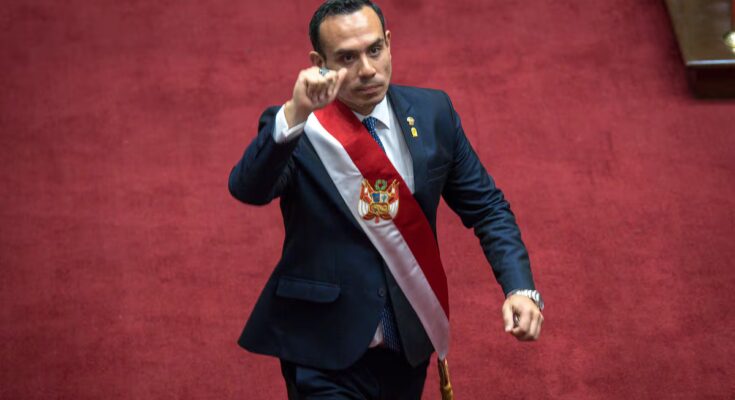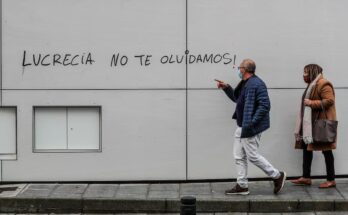Three days after a protester was killed by a policeman during a street demonstration, the interim president of Peru, José Jerí, carried the platform with the image of the Lord of Miracles through the streets of Lima. Dressed in a purple robe and wearing a religious medal, Jerí was one of the devotees who carried the 900-kilogram image of the crucified Jesus Christ on their shoulders. This procession dates back to the 17th century, when an earthquake hit the town and the mural, painted by a slave, remained standing. This miracle is commemorated every October in the largest religious gathering of Peruvian Catholicism.
Jerí’s first public appearance after succeeding Dina Boluarte following her removal from office on 10 October was perceived by a large segment of the population as a demonstration of hypocrisy and indifference towards the suffering of others. But it was also seen as a gesture of gratitude from a politician who ended up becoming president without even garnering enough votes to be elected to Congress.
Jerí started out with everything against him – the seventh president since 2016 belongs to a discredited political class and is the target of a youth movement that has taken its anger to the streets – but he opted for a strategy that works, from Washington to Lima: the “influencer” president. After his first month of approval in office, the latest poll conducted by CPI, one of the country’s leading polling firms, gave him a rating of 55.9%. This is an extraordinary figure compared to the 3% with which Dina Boluarte left office.
How to explain this contrast between two politicians who did not win the polls? Although Boluarte set the bar too low, several analysts agree that Jerí has distinguished himself by resorting to old formulas such as tough-on-crime rhetoric and a populism that mixes religious sentiments with patriotic exaltation, amplified thanks to social media.
While Boluarte deleted his X account once he assumed power, Jerí has shown a mastery of social media platforms, where his team tracks his every move. But he was also helped by a TikTok impersonator named Martín Palacios, who paved the way for Jerí with a reggaeton pelvic thrust that went viral and gave the president an unexpected dose of charisma. The impact of his parody was so great that it trivialized the most sensitive issue for Jerí: a complaint for sexual violence rejected amid irregularities.
According to political scientist Carlos Meléndez, Latin America currently has four millennial presidents: Nayib Bukele in El Salvador, Daniel Noboa in Ecuador, Gabriel Boric in Chile and Jerí in Peru. “All four possess this media sensitivity of the selfie and the timely tweet. Three of them share a common goal: to take charge of the issue of public security, a structural weakness in Latin American societies”, explains the researcher from the University of Lisbon. “On one side you have Bukele (the established hardliner) and on the other Jerí (the apprentice). They have similar aspirations and talking points, but different skills to achieve their goals,” he adds.
Nicknamed “Pajerí” for his subscription to pornographic accounts – which he has since unfollowed – the interim president has adopted a political style similar to that of Bukele. In the midst of a crime wave, with extortionists terrorizing the country, his first move was to pose for photos with high-ranking members of the military, even before forming his cabinet, and visit the country’s most overcrowded prisons, adopting a tough attitude towards criminals. Weeks later, he declared the fifth state of emergency in the provinces of Lima and Callao in the past three years. “We will move from defense to attack in the fight against crime,” promised the leader, who turns 39 on Thursday.
But crime statistics, unlike his popularity ratings, do not support his strategy. According to the computerized national register of deaths (Sinadef), 147 murders were reported during one month of the administration; the feeling of insecurity persists and the most affected are transport workers and small entrepreneurs who are killed daily by organized crime.
Former Deputy Interior Minister Julio Corcuera believes that Jerí’s visits to neighborhoods – always wearing a white shirt with his sleeves rolled up – created the impression of a willingness to work. However, he makes clear that these efforts alone are insufficient and, without coordinated intelligence work, will have minimal impact. “When this presence (both in the media and on the field) does not translate into a real decrease in crime, it gives credence to the thesis that it is only a half-study”, underlines the security expert.
In an article titled “The Oppressive State is a Male Rapist,” former congresswoman Rocío Silva Santisteban describes Jerí as a criollo politician with a “pompous voice and patriarchal behavior” who has become a meme (Pajerí) because of his vile desires. “Beyond the crude mockery and indignation of citizens, Jerí has installed himself in the Presidential Palace with actions that further entrench him in his homosocial fraternity as an exaltation of virility,” he argues. “It’s not that difficult to draw a contrast with Boluarte.”
Since the 2021 election campaign, under the Somos Perú (We are Peru) party, José Jerí has demonstrated that old-fashioned populism is one of his weapons. He recorded a commercial with former boxer Jonathan Maicelo, in which, appearing noticeably heavier, he promised to eliminate crime, corruption and corrupt members of Congress. He recently welcomed the players of Universitario de Deportes, the club that has won the Peruvian football title for the last three years, via video call. Additionally, he flew over the city in a helicopter and walked along Abancay Avenue in central Lima during protests against him.
His foreign policy also served to distance himself from his predecessor. Jerí was divisive with his decision to delay granting safe passage to Betssy Chávez, a former prime minister under Pedro Castillo accused of being one of the co-authors of Castillo’s failed coup in late 2022, and who was taking refuge in the Mexican embassy in Peru. Within days, Peru severed relations with Mexico, expelled the head of the diplomatic mission and declared Mexican president Claudia Sheinbaum persona non grata. Furthermore, he expelled Cuban ambassador Carlos Zamora, believed to be an intelligence agent, and resumed contact with the Bolivian government.
Will José Jerí survive until July 2026, when he will relinquish power? Carlos Meléndez warns that “since the crisis of presidential instability began, no occupant of the Presidential Palace can guarantee to complete his mandate.” Even so, the campaign could offer him a reprieve: It diverts public attention and reduces demands for accountability, unless a scandal or major crisis erupts.
While groups from the southern highlands, some transport unions, Generation Z and large numbers of self-organized citizens continued to shout “everyone away,” Peru’s fourth youngest president – after Felipe Santiago Salaverry, Alan García and Manuel Pardo y Lavalle – announced that on Tuesday he will begin a three-month tour of all regions of the country. “We will listen to people’s concerns and expectations,” he said. A month ago, a presidential candidate who had defamed the citizens of the Puno region had to be escorted out by a police force to avoid being lynched. It remains to be seen how Jerí, the influencer who relies on the Lord of Miracles, will fare.
Sign up to our weekly newsletter to get more English-language news coverage from EL PAÍS USA Edition



